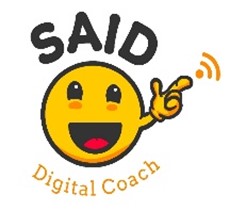SAID
Digital coaches support primary school pupils and teachers in dealing with digital media
Project Number: 2021-2-AT01-KA220-VET-000049793
Inclusive schools are a key educational policy goal of the United Nations (Römer & Malina, 2014), but this is limited to the level of pupils. The Erasmus+ project SAID - School Assistance Inclusive & Digital, led by the Graz-based association atempo, deals with school inclusion from the perspective of teachers: young people who themselves have a learning disability support children and teachers as digital coaches in the digital world.
Initial situation:
In 2001, the OECD defined the term "digital divide", which refers to the differences between people, households, companies and geographical areas with different socio-economic backgrounds. These differences affect both access to information and communication technologies (ICT) and the use of the internet for various activities. People with disabilities are among those most affected by the digital divide and are left behind without knowledge of digital accessibility and the opportunities that digital media can offer (Negreiro, 2015).
For several years, young people with learning disabilities have been able to train as school assistants for digital education in a pilot project at the Graz-based association atempo. They then have the opportunity to work as "DigiCoaches" at elementary school in Graz and pass on the digital skills they have acquired as experts. This offers solutions to two important challenges: Firstly, it addresses the need to enable and support digital accessibility and inclusion for pupils and the entire school community. Secondly, the pilot project offers innovative education and training opportunities in response to the lack of employment opportunities for people with disabilities. The DigiCoaches experience themselves as experts, which strengthens their competence-oriented self-image. Prejudices against people with disabilities are broken down throughout the process.
The project:
The SAID - School Assistance - Inclusive & Digital project is funded by Erasmus+ as a cooperation partnership in the field of vocational education and training and will run for 30 months (01.06.2022-30.11.2024). Four partners from three European countries (Austria, Ireland, Finland) are working together on the project.
The team of researchers from the University of Graz is collecting and evaluating the experiences of the DigiCoaches who are already working in elementary school in Graz. To this end, various surveys will be carried out using participatory research methods and evaluated taking into account the perspectives of (1) DigiCoaches, (2) pupils, (3) teachers and head teachers and (4) key workers at atempo. At the same time, the framework conditions for the best possible future use of DigiCoaches in Austria, Finland and Ireland will be explored.
The core of the project is the development of a curriculum for training as a DigiCoach, which is to be used in the partner countries. The development and assessment of the curriculum will also take place in a participatory process involving the DigiCoaches themselves, their trainers and coaches at atempo as well as the students, teachers and head teachers who work with them.
In addition to the curriculum, the SAID project partners are developing training materials for the further training of DigiCoaches as well as manuals for schools in which the DigiCoaches will be deployed in the future. All materials will be published open access and in three languages (English, German, Finnish). The aim is to create a framework that enables all those involved to establish a good working relationship with the DigiCoaches, drawing on best practices and experience already gained.
SAID wants to show that in a community, everyone can learn from each other and on an equal footing. Professional inclusion is practiced directly through collaboration with people with learning disabilities who work as experts and key personnel and support digital accessibility in education. SAID thus makes a significant contribution in the field of professional digital transformation.
Researchers:
- Assistant Professor Dipl .-Sprachwiss.in Susanne Seifert, PhD
- Valerie Fredericks, BA MSc
- Yvonne Fasching, BA
- Caroline Breyer, Bakk. MSc PhD (temporary)
- Olena Sereda, PhD (temporary)
Partner organizations:
- Verein atempo, Graz, Austria (project coordination)
- SJOG (Saint John of God Hospitaller Services Group), Dublin, Ireland
- TRYcamps, Porvoo, Finland
Bibliography:
- Negreiro, M. (2015). Bridging the digital divide in the EU.
- Römer, K. & Malina, B. (Eds.). (2014). Inclusion: Guidelines for education policy (C. Busch, transl.) (3rd expanded edition). German UNESCO Commission.

